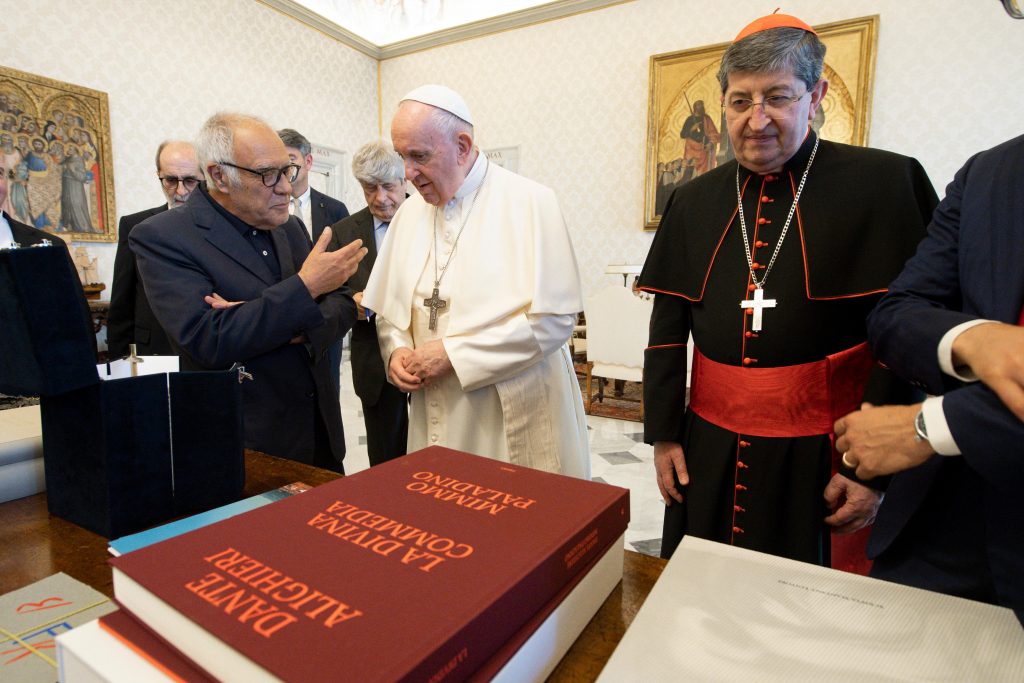The popes have been more consistently kind to Dante than Dante was to the popes.
Some sovereign pontiffs he placed at the heights of heaven. Others he portrayed in purgatory, where they were gratefully working off their sins. More than a few, however, he consigned to the depths of hell, where he seemed to take delight in describing their torments.
In fact, many of the popes of Dante’s lifetime fared badly in the afterlife that he imagined. And through the mouth of one of the damned, the poet even ventured a prophecy that the reigning pope would soon join his most disreputable predecessors in the everlasting Bad Place.
Nevertheless, the later popes have proclaimed only praise in return.
In the late 19th century, Pope Leo XIII honored him, as did his immediate successor, St. Pope Pius X. But in 1921, Pope Benedict XV actually dedicated an encyclical letter — the second-highest expression of papal teaching authority — to Dante, addressed to “professors and students of literature and learning in the Catholic world.”
Dante, Pope Benedict wrote, ranks highest “among the many celebrated geniuses of whom the Catholic faith can boast who have left undying fruits in literature and art.” Pope Benedict didn’t qualify the statement. He didn’t hedge. In fact, he went on to double down, arguing that “the whole world,” not just Italy, must “pay honor to that noble figure, pride and glory of humanity.”
Later popes followed suit. In 1965, at the end of the Second Vatican Council, St. Pope Paul VI dedicated the lengthy apostolic letter, “Altissimi Cantus” (For the VII Centenary of the birth of Dante Alighieri), to Dante, whom he called “the lord of sublime song.”
In the name of the Church, Pope Paul praised not only the poet’s art, but also his virtue. The Church, he said, “places Dante among the illustrious, those who are clothed with courage and prudence, who compose poems according to the laws of art, and, who love beauty.”
It should be no surprise, then, that St. Pope John Paul II — himself a poet — cited Dante as a doctrinal source, quoting the Paradiso in his 2005 apostolic letter on the rosary.
Pope Benedict XVI, for his part, gave an address in 2006 in which he used “The Divine Comedy” as a key to understanding his first encyclical, “Deus Caritas Est” (“God Is Love”). His text encompassed the central mysteries of faith — Trinity, Incarnation, charity — and illuminated them with Dante’s insights.
It fell to Pope Francis to reign at the seventh centenary of the poet’s death, and he has responded with two substantial statements: a message to the Pontifical Council of Culture in 2015 and the apostolic letter “Candor Lucis Aeternae” (“Splendor of Light Eternal”) this year. Pope Francis even quoted Dante in his encyclical letter “Laudato Si” (“Praise Be to You”).
In his most recent letter he urged Catholics to read the master, whom he called “prophet of hope and witness to the human desire for happiness.” Dante, he declared, “can help us to advance with serenity and courage on the pilgrimage of life and faith that each of us is called to make, until our hearts find true peace and true joy, until we arrive at the ultimate goal of all humanity: ‘The Love which moves the sun and the other stars.’ ”

